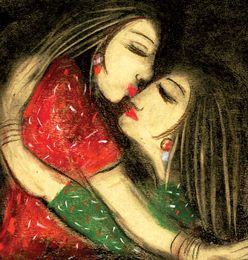On May 28, a Mumbai-born and lovelorn Divyesh Nagwekar pleaded, on the prime minister’s grievance portal, for changing India’s British-era gay laws that had criminalised same-sex liaisons. The next day Lucky Saxena of Lucknow joined the plea. Neither received a reply.
The Supreme Court has now come to the aid of the thousands of Divyeshs and Luckys, and asked the state not to peep into same sex-shared bedrooms. The civil society has since been opening champagne bottles, and the political class is joining the party, flashing V-signs. Gatecrashers, all!
The entire political class—the leftists, the rightists, the centrists and the provincials—had been meekly silent on an issue that had been agitating the court, the rights activists and the media for over five years. Conceded, stray voices had been heard from the politicos against the 2013 judgment that had recriminalised gay gallivanting and lesbian liaisons. Sonia and Rahul made half-hearted statements on the side of reform, but had done nothing when their party was ruling. Arun Jaitley and the RSS paid lip service to reform, but sat tight. “A decision regarding Section 377 of IPC can be taken only after pronouncement of judgment by the Supreme Court,” Narendra Modi’s junior Home Minister Kiren Rijiju said in a written reply. Straight!
Simply put, our ‘progressive’ Parliament was as prudish as the parlour in a middle-class home. Only Shashi Tharoor made himself bold to move two private-member bills seeking to legitimise liaisons lesbian and gay. Cheek!—considering that he represents a constituency peopled mostly by the middle-class. But sad!—considering that both his bills were trashed by our Parliament of prudes without as much as a discussion. Let the court carry the cross, the law-makers thought.
Was it the court’s cross? It wasn’t; it was Parliament’s. Both the Delhi High Court and the 2013 Supreme Court orders had made it clear, though their decrees disagreed. The High Court, which had decriminalised gay and lesbian liaisons, had said: “We declare that Section 377 IPC... is violative of Articles 21, 14 and 15.... This clarification will hold till... Parliament chooses to amend the law.”
Parliament did not choose to amend the law; the civil society did not make a case to Parliament. As the case went in appeal to the Supreme Court, the latter failed even to do its homework. It could not prove to the court how the rights of sexual minorities were being denied. The court overturned the High Court order in 2013, resting themselves on the principle that all laws are presumed to be good till proven otherwise, and that smiting at laws with judicial lances should be the last resort.
The court had then also found that Parliament had amended the IPC at least 30 times since 1950, but on no occasion had it even looked at Section 377. “This shows that Parliament, which is undisputedly the representative body of the people of India, has not thought it proper to delete the provision.” And added: “[T]he competent legislature shall be free to consider... deleting Section 377 IPC from the statute book or amend the same.”
But the competent legislature, the Atlas of a billion citizens’ rights, shrugged and shirked shamefully. As they lost the case, the civil society simply cursed the court bell, book, candle and kamandal.
Finally, the court took the burden of upholding the rights upon its shoulders again. It formed a larger bench, and delivered a progressive decree, but in anguish. We heard that anguish when, in a rare public outburst, Justice D.Y. Chandrachud wondered: “Why do politicians sometimes hand over power to judges?”
Honourable MPs, you have to lead us from the front; not from the rear.
Gays, pardon the pun, though intended.
prasannan@theweek.in


